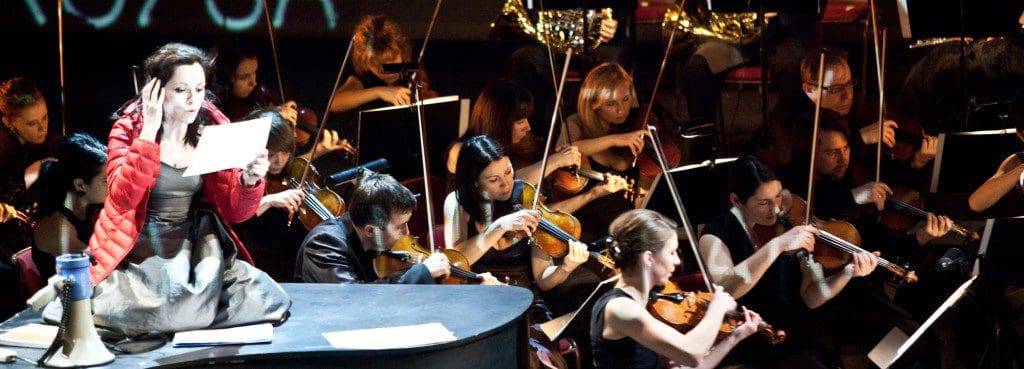Stripping the Piano Poet of his Piano: Michał Zadara on CHOPIN WITHOUT PIANO
It’s a radical concept, to strip the piano composer of his piano. But really, isn’t that just the way Chopin would have wanted it? A radical progressive for his time, he would have appreciated a subversive approach to his music.
Where on earth did the idea come from? We caught up with director Michał Zadara to chat about the genesis and development of Chopin without Piano, experiencing its US premiere at Swarthmore before its run at FringeArts this Saturday!
FringeArts: How did the idea for Chopin without Piano first come about?
Michał Zadara: We first started thinking about CWP three years ago when the conductor Jacek Kaspszyk told me a story about a performance of the concertos to which the pianist did not show up. But instead of canceling the concert, the first violinist decided that they would play all the non-piano sections, and that he would simply explain to the audience what the piano is doing. And when I heard that story, I thought, that’s an an amazing opportunity for theater—to play both of Chopin’s piano concertos, but without the piano, with an actor describing what the piano does but as an exact equivalent of the piano part. As a kind of a lecture, a kind of entry into the musical world of Chopin, but also as a way to criticize and attack the way Chopin had been absorbed by Polish culture but never really processed. How Polish culture has instrumentalized Chopin. We wanted to come back to an original Chopin, a Chopin who was a radical artist of his time, wild, incomprehensible, transcending the boundaries of what people thought was possible in music.
FringeArts: How did you and Barbara Wysocka develop Chopin without Piano? 
Michał Zadara: We first looked at each of the six parts—both concerts have three parts—and realized that each one of them is a very unique piece, and has a very different approach to how the music works in each part. These aren’t just different melodies, but different ways of making music. So we decided that each part had to have a different character in the text part—and then we thought: well, how can one talk about Chopin? So eventually, the first part became very musicological, the second biographical, the third cultural–political, the fourth philosophical, the fifth personal and the sixth a kind of collage/mixture. And while we were working on this, we just read and read as much as we could, and then we would sit down, listen to the music, analyze the structure, and put verbal or logical themes I place of the musical ones. So if in a piece you have theme A, which is repeated four times with variations, we have a verbal thought that we repeat with variations four times. And we listened to those concertos so much when writing that in fact we didn’t need to rehearse that much—about four weeks—because we were so familiar with the piece.
FringeArts: Was it difficult to get the musicians on board with the premise?
 Michał Zadara: In fact it wasn’t so difficult—but I suspect that was because our principal conductor was Jacek Kaspszyk, who is pretty much acknowledged as the preeminent Polish conductor, and in fact became the director of the national Philharmonics shortly after we finished this project. So people generally trust that he wouldn’t be involved in something that isn’t a hundred percent legit in terms of musical seriousness. You have to remember that Barbara is a trained violinist, and that even though she is performing as an actress, she continues to think as a musician throughout the piece.
Michał Zadara: In fact it wasn’t so difficult—but I suspect that was because our principal conductor was Jacek Kaspszyk, who is pretty much acknowledged as the preeminent Polish conductor, and in fact became the director of the national Philharmonics shortly after we finished this project. So people generally trust that he wouldn’t be involved in something that isn’t a hundred percent legit in terms of musical seriousness. You have to remember that Barbara is a trained violinist, and that even though she is performing as an actress, she continues to think as a musician throughout the piece.
FringeArts: What did you concentrate on when fine-tuning this work?
Michał Zadara: What keeps the piece alive is that strange contradiction: we got rid of the piano part, but it still exists as the element behind the text. Barbara doesn’t sing the text, but the piano score is always there as a muted point of reference—so the audience can hear it implicitly through her description—they hear it with their mind’s ear. So the most important aspect of the project is the evocation of that which is not present, which has always been the most important aspect of theatrical performance, whether it’s the invocation of the dead at ancient rituals, or the portrayal of a non-existent character in modern psychological drama.
FringeArts: Why is Chopin so important to Poland and Polish culture/identity?
Michał Zadara: It is really difficult to summarize the relationship of Chopin to Polish culture and to Polish self-awareness—but Chopin in fundamental to both of these. Without a doubt, Chopin is the most eminent Polish composer: he is the only one whose pieces have become part of the basic repertory of western music. So he makes those Poles happy who find it difficult to come to terms with coming from a minor, peripheral, non-colonizing culture. He, long with Copernicus, gives them a whiff of “greatness.” So you can see how Chopin’s undeniable genius is tied in to the problems that Poles might have with themselves and their culture. And probably because of this, Chopin in Poland has been squeezed into a mold of “Polish” culture, his music somehow expressing the national spirit—and this, we argue in our piece, is stupid. The defining aspect of Chopin’s art is alienation—from one’s country, from one’s music, from one’s family. So the crucial gesture that appears in the context of Chopin over and over again is a violent rupture. Which is not a way that anyone, outside or inside of Poland, has spoken about Chopin until now.
Thanks so much, Michał!
Chopin without Piano runs at FringeArts October 28-31. Join Michał after the performance on October 28 in the La Peg bar, and enjoy the signature “Spirit of the Show” – the Starlotka (Polish vodka, apple cider)!




